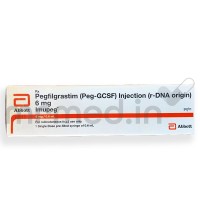Mem Injection contains an active component such as Methylergometrine. Mem Injection, also known as methylergonovine, is a medication that is used to prevent or treat excessive bleeding (postpartum hemorrhage) following childbirth. It belongs to a class of drugs called ergot alkaloids, which have uterine-constricting effects and can help control bleeding by promoting the contraction of the uterine muscles. This is beneficial not only for the mother's well-being but also for the overall postpartum recovery process.
Mem Injection should not be used in individuals with a known hypersensitivity or allergy to Mem Injection or any of its components. Individuals with severe hypertension (high blood pressure) should not use it. Avoid consuming grapefruit or grapefruit juice while taking it, as it can potentially interact with and affect medication levels. It is generally not recommended for use in cases of preeclampsia or eclampsia. It may be contraindicated in individuals with severe liver or kidney impairment due to potential difficulties metabolizing and eliminating the medication.
Mem Injection may not be recommended in cases of sepsis (a severe infection that can lead to systemic inflammation and organ dysfunction) due to potential interactions and effects on blood pressure. It might be contraindicated in cases where uterine contractions could be harmful, such as cases of placental abruption (premature separation of the placenta) or other conditions where increased uterine contractions could worsen the situation.
- Prevention of postpartum hemorrhage
- Management of postpartum hemorrhage
Therapeutic Effects of Mem Injection
Pregnancy
Mem Injection is not safe for use during pregnancy, especially in the early stages, due to its potential to cause uterine contractions.
Breast Feeding
Mem Injection can pass into breast milk, and its use while breastfeeding should be discussed with a healthcare provider.
Lungs
Mem Injection's primary action is on uterine muscles and may not directly affect lung conditions. Still, informing your healthcare provider about any preexisting lung conditions before using this medication is crucial.
Liver
Individuals with liver conditions should consult their healthcare provider before using Mem Injection.
Alcohol
Alcohol consumption is unsafe while using Mem Injection. Alcohol can interact with medications and might exacerbate side effects.
Driving
Mem Injection could impact your ability to drive safely if you experience side effects like dizziness or headache. It is not safe to drive if you're experiencing these effects.
Serious
- Hypertensive crisis
- Chest pain or angina
- Seizures
- Stroke
Common
- Nausea and vomiting
- Uterine cramps
- Headache
- Increased blood pressure
- Dizziness
- Abdominal discomfort
Mem Injection might trigger migraines in some cases, so discuss your medical history with your doctor.
It's primarily used in postpartum women and not intended for use in men.
Completing the full course as your doctor prescribes is important to ensure its effectiveness.
It's primarily used for preventing or managing postpartum bleeding. Its use in other emergencies depends on your doctor's recommendation.
The duration of use depends on your specific situation and your doctor's recommendation.
Yes, Mem Injection can lead to increased blood pressure, so its use should be closely monitored, especially in individuals with hypertension.
Molecule name: Methylergometrine | Therapeutic class: Uterotonic agents |
Pharmacological class: Ergot alkaloids | Indications: 1. Prevention of postpartum hemorrhage 2. Management of postpartum hemorrhage |







